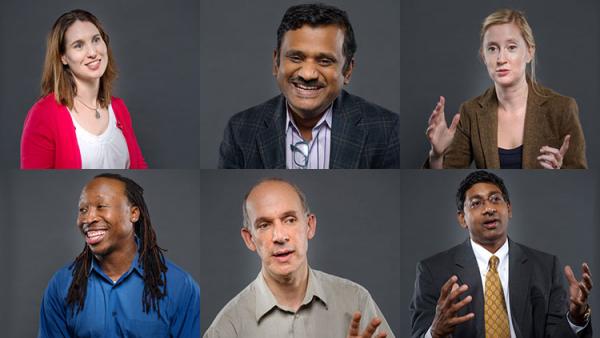Biomedical engineering at Georgia Tech has risen from a handful of projects to national prominence in just two decades. Today, more than half of all incoming freshman pursue a degree in biomedical engineering, biochemistry, or biology. These students want to both understand living systems and make things that improve people’s lives.
Now, more than ever, those opportunities are plentiful in biosciences at Georgia Tech, where researchers are creating medical devices for children, understanding how diseases occur, improving vaccines, and building better biomaterials for drug delivery. Georgia Tech’s unique blend of engineering, biology, chemistry, and computing — along with partnerships with world-class medical facilities in Atlanta, such as Emory University and Children’s Healthcare of Atlanta — has transformed the Institute’s campus into a magnet for bio-minded scientists.
“What we bring to the table is a new perspective in the biological sciences that is data driven, that is quantitative, that focuses on devices and techniques and on being unafraid to ask fundamental questions,” said Ravi Bellamkonda, the chair and professor of the Wallace H. Coulter Department of Biomedical Engineering at Georgia Tech and Emory University. “It’s a different approach to biology as an engineer.”
The rise of biomedical engineering at Georgia Tech has created a ripple effect across the biosciences on campus. Biologists studying genetics, ecology, and personalized medicine are collaborating with engineers to solve challenging medical problems. The bio quad, home to the Parker H. Petit Institute for Bioengineering and Bioscience (IBB); the U.A. Whitaker Biomedical Engineering Building; the Ford Environmental Science and Technology (ES&T) Building; and the Molecular Science and Engineering (M) Building, already forms a hub of interdisciplinary research. Soon, other collaboration-oriented buildings will be added, solidifying the Institute’s commitment to developing its bioscience portfolio, which touches everything from mechanical engineering, to electrical engineering, to materials science and engineering.
Bioscience the Georgia Tech way has attracted high-profile faculty, such as M.G. Finn, pioneer of click chemistry and rumored Nobel Prize candidate. Also flocking to campus are fresh young minds, such as Susan N. Thomas, an assistant professor in the new field of immunoengineering. These researchers and others, who might not have come to Georgia Tech even 10 years ago, say that the Institute is already making a dent in some of the world’s biggest medical challenges, and is poised to do more. Nascent fields of research, such as immunoengineering, systems biology, pediatric bioengineering, chemical biology, and biomanufacturing, are emerging strengths on campus, positioning Georgia Tech to help define what these fields become. Georgia Tech is already recognized as a leader in regenerative medicine, cardiovascular engineering, neuroengineering, and mechanobiology.
“Considering what had been done in the past 10 years, I thought the next 10 years at Georgia Tech would be pretty exciting,” said Finn, the interim chair and professor of the School of Chemistry and Biochemistry. “Very few places in the world — if anywhere — will embed fundamental science in with applications science and technology better than we do here.”
Read more of this article from Georgia Tech's Research Horizons magazine.
Media Contact
Brett Israel
404-491-6792
Latest BME News
Jo honored for his impact on science and mentorship
The department rises to the top in biomedical engineering programs for undergraduate education.
Commercialization program in Coulter BME announces project teams who will receive support to get their research to market.
Courses in the Wallace H. Coulter Department of Biomedical Engineering are being reformatted to incorporate AI and machine learning so students are prepared for a data-driven biotech sector.
Influenced by her mother's journey in engineering, Sriya Surapaneni hopes to inspire other young women in the field.
Coulter BME Professor Earns Tenure, Eyes Future of Innovation in Health and Medicine
The grant will fund the development of cutting-edge technology that could detect colorectal cancer through a simple breath test
The surgical support device landed Coulter BME its 4th consecutive win for the College of Engineering competition.








